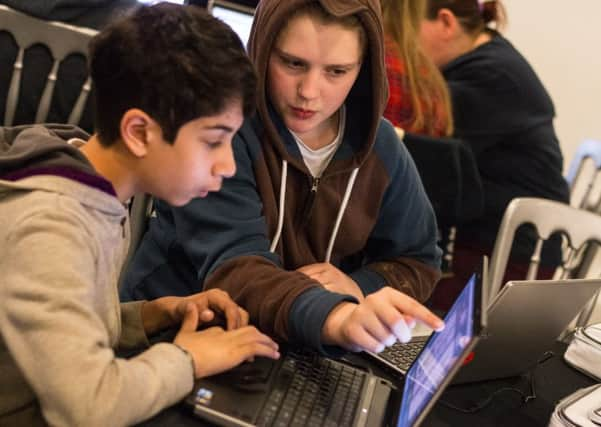Coding in Scotland: What is it, why you should learn and how to start


WHAT IS CODING?
According to CodeClan, Scotland’s first-ever digital skills academy, coding is the process of creating and scripting the instructions to run computer programmes. Coding is relevant to every digital device you use today; whether that’s to cook food in a microwave or to identify a song playing in the background via an app on your mobile phone.
Programming languages such as C+, C#, Java, Python and Ruby are used worldwide by companies as diverse as Instagram, Shopify and Google to provide a host of digital services.
WHY WOULD I WANT TO LEARN IT?
Advertisement
Hide AdAdvertisement
Hide AdWith a shortage of approximately 11,000 digital skilled workers in Scotland according to CodeClan, the Scottish Government has encouraged investment into coding tuition across the nation.
As well as the favourable employment climate for those familiar with coding languages, it is hoped that Scotland will become a world-leading digital nation with access to a talent pool stocked with exceptional digital skills.
Due to high demand, salaries in Scotland’s burgeoning technology industry are significantly higher than other sectors, with many specialist positions starting around £40,000 per annum according to salary comparison site PayScale.


Lorna Gibson, Scotland Coordinator for volunteer-led after-school coding organisation Code Club said: “Learning to code improves problem solving and logical thinking abilities, and is highly desired by employers.
“However, being able to code can open up lots of different career opportunities, such as [becoming a] digital artist, filmmaker, musician or academic researcher who use code for data collection and analysis.”
HOW DO I START LEARNING TO CODE?


There are several organisations throughout Scotland that offer a gateway into coding, whether you’re a child novice or amateur adult coder.
Code Club teaches coding through after-school workshops across the UK, with coding language Scratch used to teach 9-11 year-olds due to its simple drag-and-drop interface before progression to HTML and CSS languages.
CodeClan operates a 16-week course offering a Professional Development Award in Software Development recognised by the Scottish Qualifications Authority.
Advertisement
Hide AdAdvertisement
Hide AdCoder Dojo also offers a programme of free, volunteer-run programming lessons for children aged 7 to 7. For those older than school age, Project Manager of CoderDojo Scotland Craig Steele said: “Adult learners can take lessons online, or attend a college or University course.”
In a statement on their website, CodeClan added: “There are a large number of online tutorials available and many are free. Some popular sites are Codeacademy, Code Avengers, CodeSchool and Treehouse.”
These online resources are a viable alternative to coding boot camps for those who may not have the time or ability to travel.
WHAT ELSE DO I NEED TO KNOW?
All of the professionals we spoke to were quick to dispel the myth that coding is a complicated and strenuous skill.
Coder Dojo’s Craig Steele said: “You have to have a good attention to detail, and be able to think through a problem logically. Once you’ve learned the basics you’ll realise it isn’t that difficult.
“Not everyone will be an expert programmer - but everyone would be able to give it a shot.”
Gibson of Code Club added: “Although no prior computing or programming knowledge is required to learn to code, it’s useful to have certain skills which young people are also taught as they work through the projects in our curriculum. For example, how to think logically about a computer program when it isn’t doing as you’d expect it to.
“Coding is a fun activity and a useful skill. Knowledge of coding also gives people tools to bring their ideas, games, animations and websites to life.”
WHAT’S IN STORE FOR THE FUTURE?
Advertisement
Hide AdAdvertisement
Hide AdSteele would like to see coding given more visibility in schools and educational establishments across the nation He said: “It would be exciting to see more digital-making skills like computer programming being used across a variety of different subjects.
“Could an English class analyse a Shakespeare play using code, or could a PE class build wearable technology to help athletes train better?”
Gibson added that running a Code Club in a local school, library or community centre is beneficial to both the teacher and students, as both groups will learn valuable coding skills.
